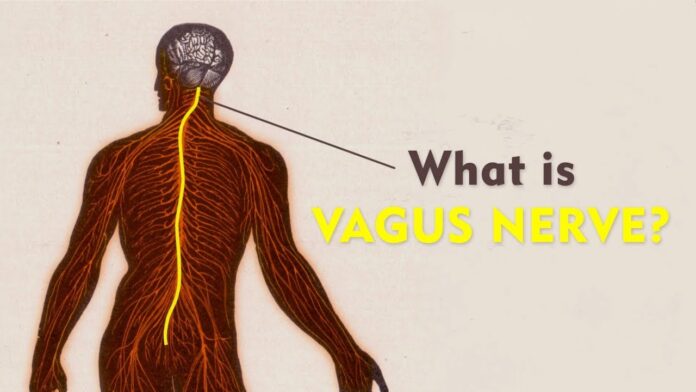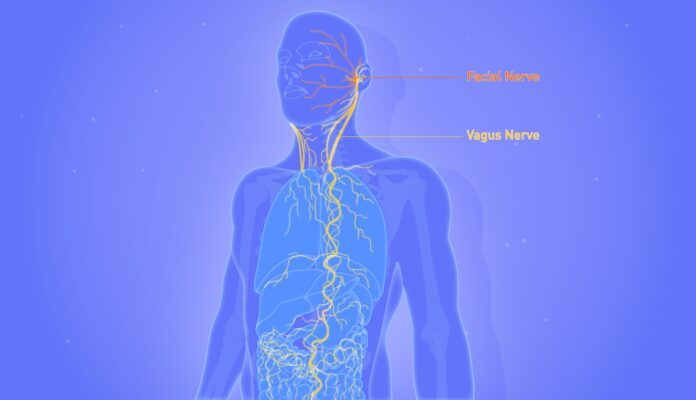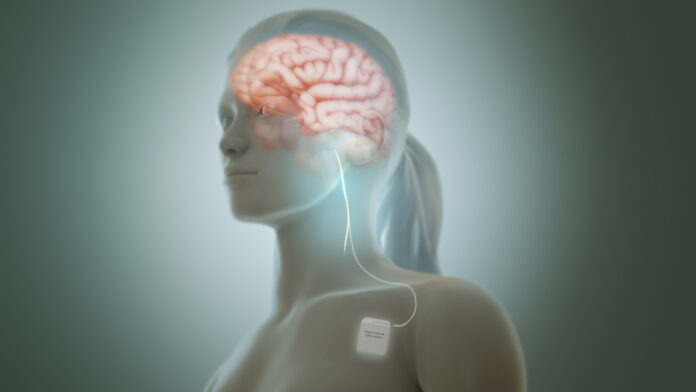Are you new to the idea of vagus nerve stimulation? This lengthy nerve serves various important functions in the human body, and scientists are only beginning to unlock all of its potential. In this article, we’ll discuss the benefits of vagus nerve stimulation (VNS) as well as several vagus nerve exercises to try.
What is the Vagus Nerve?

It is the longest cranial nerve in the human body. It begins in the brainstem and extends down to the abdomen. This nerve is responsible for a variety of essential functions, including:
- Controlling the heart rate
- Regulating blood pressure
- Aiding in digestion
- Controlling inflammation
- Communicating between different areas of the brain
The Vagus Nerve and the Parasympathetic Nervous System

To better understand the vagus nerve’s role, it helps to know a little about the nervous system. The human nervous system can be divided into two main sections: the sympathetic nervous system (SNS) and the parasympathetic nervous system (PNS).
The SNS is responsible for the “fight-or-flight” response. This is the bodily response that occurs when we feel threatened or stressed. When the SNS is activated, our heart rate increases, our blood pressure rises, and we release stress hormones like cortisol.
In contrast, the PNS is responsible for the “rest-and-digest” response. This bodily response occurs when we are relaxed and at rest. When the PNS is activated, our heart rate slows, our blood pressure decreases, and we release calming hormones like serotonin.
The vagus nerve is the main nerve of the PNS. It plays a crucial role in regulating the body’s response to stress. In turn, this has a number of important implications for our health.
Benefits of Vagus Nerve Stimulation

Now that we know a little about the vagus nerve and the nervous system, let’s discuss some potential benefits of vagus nerve stimulation.
Might Reduce Inflammation
One of the main functions of the vagus nerve is to control inflammation. This is done through a process known as the cholinergic anti-inflammatory pathway. When the vagus nerve is stimulated, it releases a neurotransmitter called acetylcholine. This molecule then binds to receptors on immune cells, causing them to produce less inflammation-causing cytokines. This can help reduce the symptoms of conditions like arthritis, Crohn’s disease, and psoriasis.
Vagus Nerve Stimulation May Help to Treat Depression and Anxiety
Depression is a common mental disorder that is characterized by feelings of sadness, hopelessness, and fatigue. While many different treatment options are available for depression, vagus nerve stimulation may be a particularly effective option. This is because vagus nerve stimulation has been shown to increase levels of neurotransmitters like serotonin and norepinephrine, which are known to have mood-boosting effects.
Like depression, anxiety is a common mental disorder that can significantly impact quality of life. Fortunately, vagus nerve stimulation may also be effective for treating anxiety. This is because vagus nerve stimulation can help to reduce the activity of the sympathetic nervous system (SNS). As we mentioned before, the SNS is responsible for the “fight-or-flight” response. Therefore, by reducing SNS activity, vagus nerve stimulation may help to reduce anxiety symptoms.
May Help to Improve Heart Health
The vagus nerve plays a vital role in regulating heart rate. VNS can help the heart rate to slow down. This can have a number of important implications for heart health. For example, slowing down the heart rate can help to reduce blood pressure. In turn, this might help reduce the risk of heart attacks and strokes.
Could Improve Digestive Health
The vagus nerve also plays an important role in regulating digestive function. When the vagus nerve is stimulated, it causes the digestive system muscles to contract. This can help move food through the digestive tract and improve nutrient absorption. In addition, stimulating the vagus nerve can help to reduce symptoms of conditions like irritable bowel syndrome (IBS) and inflammatory bowel disease (IBD).
May Help to Boost Immunity

The vagus nerve also plays a big role in immunity. Vagus nerve stimulation is thought to play a role in the production of immunoglobulins. These are proteins that help to fight infection.
How Does Vagus Nerve Stimulation Work?
Vagus nerve stimulation is a treatment that involves sending electrical impulses to the vagus nerve. This can be done surgically or non-invasively.
Surgical vagus nerve stimulation (sVNS) involves implanting a neurostimulator device near the vagus nerve. This device sends electrical impulses to the nerve on a regular basis.
Alternatively, there are non-invasive ways to stimulate the vagus nerve, including with a vagus nerve stimulation device like Xen by Neuvana. This allows users to wear vagus nerve-stimulating headphones for short periods throughout the day to reap the rewards of gentle yet effective VNS. This type of VNS is done transcutaneously through the skin and is therefore, non-invasive.
Vagus Nerve Exercises

While tVNS or sVNS are excellent options for those looking for a more long-term solution, there are also some things you can do on a daily basis to stimulate the vagus nerve and enjoy the benefits.
Here are a few vagus nerve exercises to try:
- Gargle: Surprisingly, the simple act of gargling can help to stimulate the vagus nerve and promote better vocal health.
- Cold exposure: Exposing yourself to cold temperatures can help stimulate the vagus nerve and reduce inflammation. This could be as simple as taking a cold shower or going for a swim in more frigid waters.
- Deep breathing: This is another effective way to stimulate the vagus nerve. Deep, diaphragmatic breathing has been shown to have several benefits, including reducing stress and anxiety.
- Yoga: Yoga is a great way to reduce stress and promote overall relaxation. Many of the poses in yoga help to stimulate the vagus nerve, making it an excellent exercise for those looking to improve their vagal tone.
- Meditation: Like yoga, meditation is a great way to promote relaxation and reduce stress. Meditation can also help increase heart rate variability, a good indicator of vagal tone.
Regardless of your chosen method, vagus nerve stimulation is a good option to consider if you want to improve your health and well-being!









